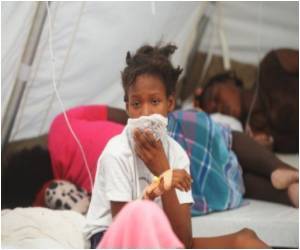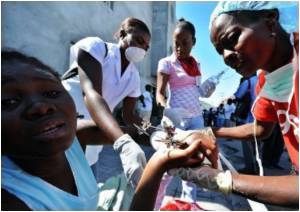
The riots, some sparked over widespread rumors that the source of the outbreak was a Nepalese UN peacekeeping base in Haiti, have hampered delivery of much-needed supplies to overcrowded hospitals and unsanitary tent cities.
The desperate situation has left public health experts with little option but to focus on the bottom line: trying to stop the rash of fatalities from the bacteria-based disease that travels mainly through contaminated water.
"We felt that the best strategy with this outbreak was to focus on preventing death," said Jordan Tappero, who leads the CDC team on cholera response in Haiti.
Tappero said CDC experts are fanning out across the country to educate people on what do at the first sign of symptoms, after a massive earthquake in January killed 250,000 people, destroyed infrastructure and sent 1.3 million people into makeshift street camps.
"The idea would be that people could begin hydrating themselves and get themselves to a treatment center" at the first sign of symptoms, he said in an interview with AFP late Tuesday.
Advertisement
Experts are examining water sources and networks in the capital, Port-au-Prince and elsewhere to make sure that people have access to clean water for drinking, bathing and washing clothes and food.
Advertisement
Lab tests determined earlier this month that the cholera strain was Vibrio cholerae serogroup O1, serotype Ogawa, similar to a type found in South Asia.
But scientists say the exact origin of the latest outbreak of the disease is all but impossible to trace.
Cholera "is a great hitchhiker. It travels by contaminated water, food or an individual who may be asymptomatic or developing symptoms," said Tappero.
"This strain is circulating in south Asia and several other countries, therefore it is going to be very challenging to actually come down with an individual source of the outbreak," he said.
"That is not where our resources and energy need to be placed right now."
Cholera was first detected in the 19th century in the Ganges Delta of the Indian subcontinent, according to the CDC. The latest pandemic of cholera is the seventh in the disease's history and started in southeast Asia in 1961.
It has since swept across parts of the Middle East and Africa as well as Latin America.
The illness can develop quickly when the bacteria gets inside a person's intestinal tract, causing watery diarrhea and dehydration that can kill within hours and is particularly fatal among children and the elderly.
A total of 1,100 have died 18,382 people hospitalized from cholera since the disease surfaced in late October, the health ministry has said.
Source-AFP











